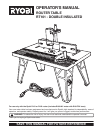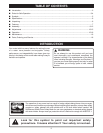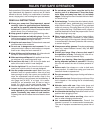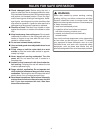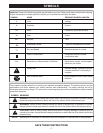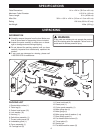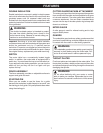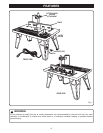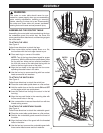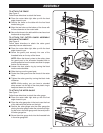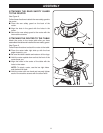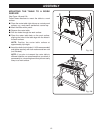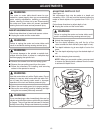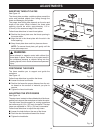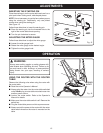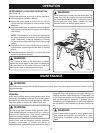
3
RULES FOR SAFE OPERATION
Safe operation of this power tool requires that you read
and understand this operator's manual and all labels
affixed to the tool. Safety is a combination of common
sense, staying alert, and knowing how your tool works.
READ ALL INSTRUCTIONS
Q Know your power tool. Read operator’s manual
carefully. Learn its applications and limitations,
as well as the specific potential hazards related
to this tool. Following this rule will reduce the risk of
electric shock, fire, or serious injury.
Q Keep guards in place and in good working order.
Q Remove wrenches and adjusting keys. Form the
habit of ensuring that hex keys and adjusting wrenches
are removed before turning on the tool.
Q Keep the work area clean. Cluttered work areas and
work benches invite accidents.
Q Do not use in dangerous environments. Do not
use power tools in damp or wet locations, or expose
them to rain. Keep the work area well lit.
Q Keep children and visitors away. All visitors should
be kept a safe distance from work area.
Q Make workshop childproof with padlocks and mas-
ter switches or by removing starter keys.
Q Do not force the tool. It will do the job better and
safer at the rate for which it was designed.
Q Use the right tool. Do not force the tool or attach-
ment to do a job for which it was not designed.
Q Use the proper extension cord. Make sure your
extension cord is in good condition. Use only a cord
heavy enough to carry the current your product will
draw. An undersized cord will cause a drop in line
voltage resulting in loss of power and overheating. A
wire gage size (A.W.G.) of at least 14 is recom-
mended for an extension cord 25 feet or less in
length. If in doubt, use the next heavier gage. The
smaller the gage number, the heavier the cord.
Q Inspect tool cords periodically and, if damaged,
have repaired at your nearest authorized service
center. Constantly stay aware of cord location.
Following this rule will reduce the risk of electric shock
or fire.
Q Do not abuse cord. Never carry the tool by the
cord or yank it to disconnect it from the recep-
tacle. Keep cord away from heat, oil, and sharp
edges. Following this rule will reduce the risk of elec-
tric shock or fire.
Q Polarized plugs. To reduce the risk of electric shock,
this equipment has a polarized plug (one blade is
wider than the other). This plug will fit in a polarized
outlet only one way. If the plug does not fit fully in the
outlet, reverse the plug. If it still does not fit, contact a
qualified electrician to install the proper outlet. Do not
change the plug in any way.
Q Wear proper apparel. Do not wear loose clothing,
gloves, neckties, rings, bracelets, or other jewelry
that can get caught in moving parts. Nonslip footwear
is recommended. Also wear protective hair covering
to contain long hair.
Q Always wear safety glasses. Everyday eyeglasses
have only impact-resistant lenses; they are NOT
safety glasses.
Q Protect your lungs. Wear a face or dust mask if
the operation is dusty. Following this rule will re-
duce the risk of serious personal injury.
Q Protect your hearing. Wear hearing protection
during extended periods of operation. Following
this rule will reduce the risk of serious personal in-
jury.
Q Secure work. Use clamps or a vise to hold work
when practical. It is safer than using your hand and
frees both hands to operate tool.
Q Do not overreach. Keep proper footing and balance
at all times.
Q Never stand on tool. Serious injury could occur if the
tool is tipped or if the cutting tool is unintentionally
contacted.
Q Maintain tools with care. Keep tools sharp and
clean for better and safer performance. Follow in-
structions for lubricating and changing accessories.
Q Avoid accidental starting. Make sure switch is in off
position when plugging in tool.
Q Disconnect tools before servicing, when not in
use, or when changing attachments.
Q Use recommended accessories. Consult the
operator's manual for recommended accessories.
The use of improper accessories may cause risk of
injury.



